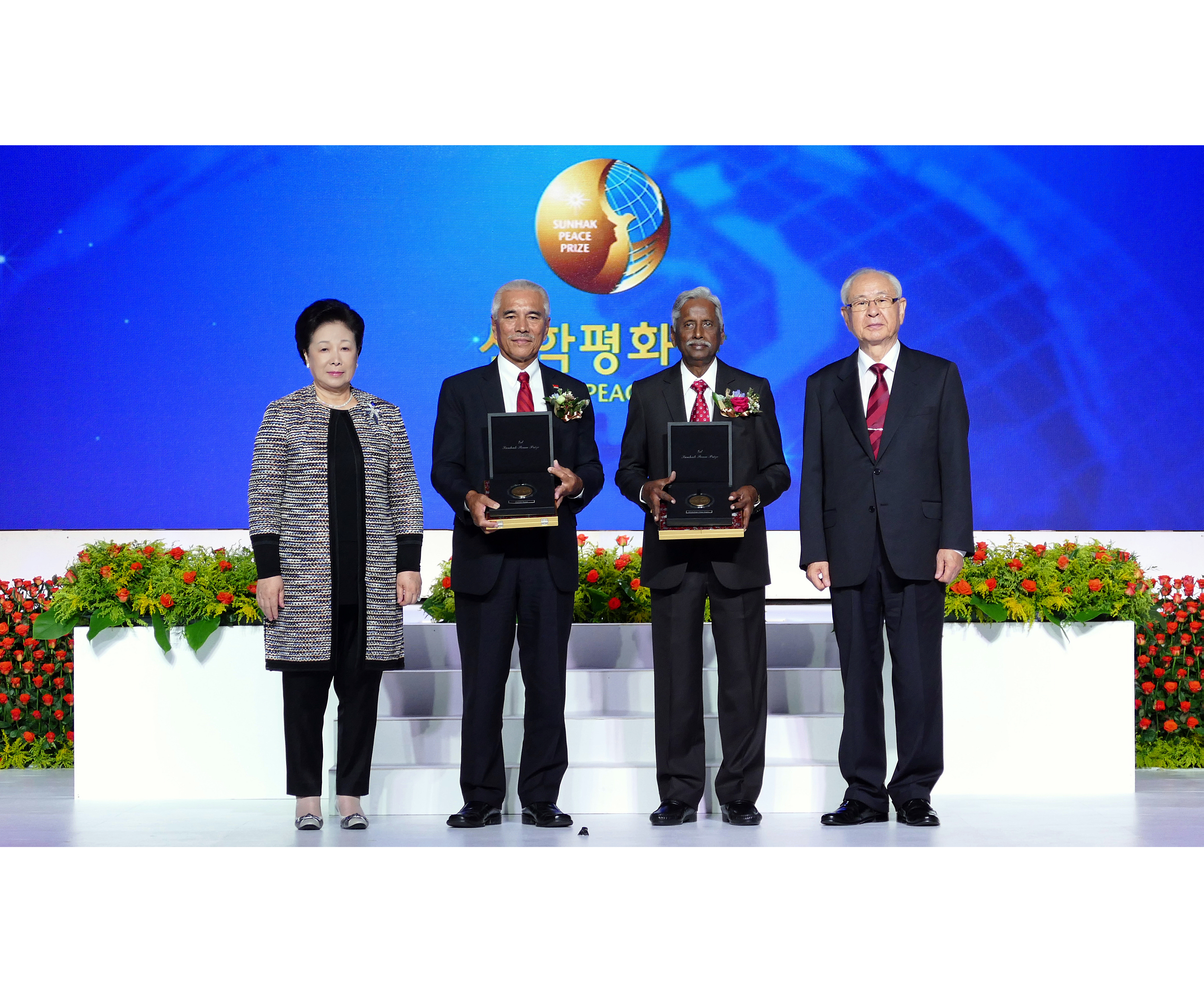2015Sunhak Peace Prize
Award Ceremony
- Date
- August 28, 2015
- Location
- Grand InterContinental Hotel, Seoul, Korea
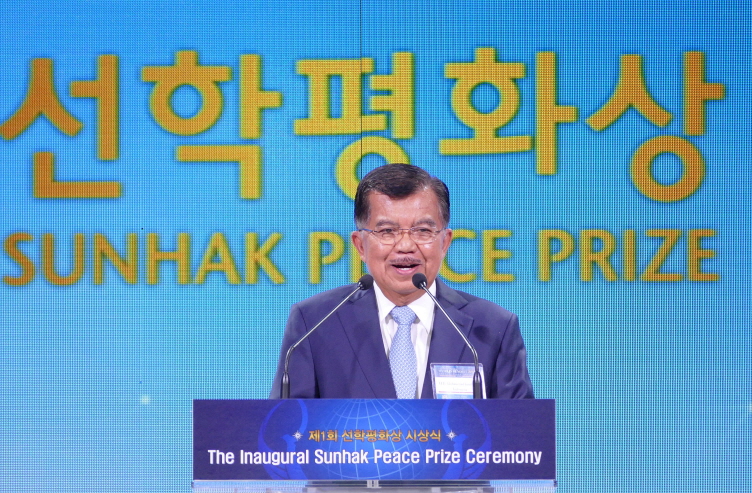
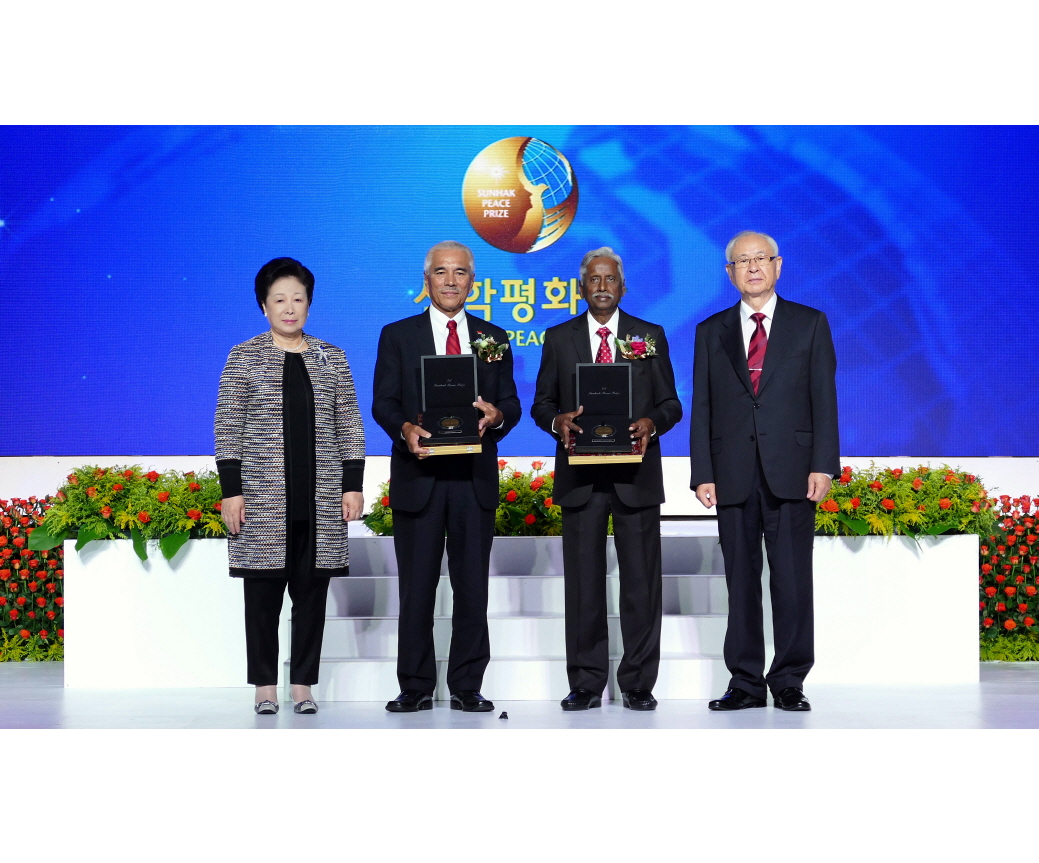
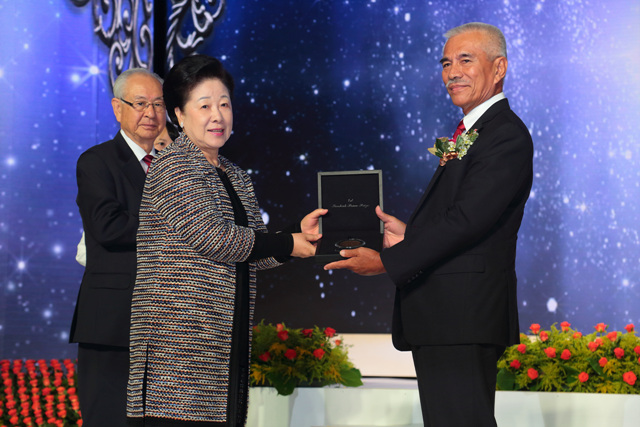
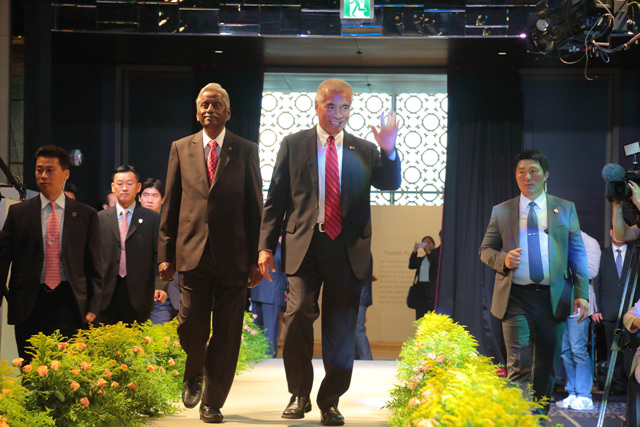
-
Sunhak Peace Prize Introductory Video
![선학평화상 소개영상 썸네일]()
-
Award Ceremony Video
![시상식 전체영상 썸네일]()
Welcoming Address
- Dr. Il Sik Hong
- Committee Chair
Dear esteemed guests,
I offer you a very passionate welcome to the inaugural Sunhak Peace Prize Ceremony, and sincerely thank all of you for this wonderful turnout. I especially extend my deep gratitude to those delegates and dignitaries who have come from all across the world to attend the ceremony today, and I would especially like to thank the Speaker of the National Assembly Mr. Ui Hwa Chung who is representing Korea.
In a time when the desire for humanity's peace is becoming more and more imperative, I feel it very significant that the inaugural Sunhak Peace Prize Ceremony is being held here in Seoul, Korea. Even from a historical standpoint, this year marks the 70th anniversary of the founding of the United Nations, and the 70th anniversary of the independence of the Republic of Korea, and thus makes this event all the more meaningful.
First and foremost, I would like to convey my deep respect and warm congratulations to the two individuals whose dedication and achievements for future peace have earned them the inaugural Sunhak Peace Prize, namely His Excellency Anote Tong, the President of Kiribati, and Dr. Modadugu Vijay Gupta, a fisheries scientist of India.
As you all know the Sunhak Peace Prize was established by Dr. Hak Ja Han Moon, the wife of the late Rev. Sun Myung Moon, to honor his teachings and accomplishments. From early on, Rev. Moon, based on his "One global family" peace vision of interdependence, mutual prosperity, and universally shared values, devoted his life to building a global community. This vision of peace is rooted from a very basic premise that the human race is one family continuing from generation to generation.
Until the past century the key issues of peace was overcoming war and violence. From the ashes of war, the League of Nations and the United Nations (UN) were established one after the other, and today, the UN is committed in its duty to prevent another world war from happening. However, entering the 21st century, other catastrophes more terrifying than war are threatening humanity. These are natural disasters and various diseases, and in particular global environmental disasters resulting from climate change and energy depletion.
As the present generation pursues growth and development in an endless competition, the Earth, our eternal home, is continuously being polluted and destroyed, and it has now reached such a serious condition that future generations will surely shoulder the weight of this damage. In the wake of this dire crisis, the Sunhak Peace Prize's grand vision, which endeavors to embrace all of humanity, proposes a new horizon of peace.
Peace is a new "civilization." In order to go beyond the limits of civilizations that humanity had constructed until the 20th century and live a truly happy lifestyle we need to create a new culture that meets the needs of the new era. The present generation has been given a historical calling to let go of its greed and selfishness and to transcend race, nation, ideals, and religion in order to create a peaceful civilization based on love for humanity.
In this new century, the Sunhak Peace Prize endeavors to sketch a new picture of peace. Under the banner "One Global Family, Making the World Better for Future Generations," we will strive to resolve humanity's conflicts and lead a new civilization of peace. We will continue to search globally for and encourage righteous and courageous people who practice the value of peace required in this new age characterized by moral legitimacy and logical rationality.
Responding to the call of history the Sunhak Peace Prize is sowing seeds of peace which will go beyond religion, race, country, and culture and continue to spread the new civilization of peace. I ask for your continued support and encouragement in this new path set before us.
Thank you
Acceptance Speech
- Modadugu Vijay Gupta
- 2015 Sunhak Peace Prize Laureate
Madam Dr. Hak Ja Han Moon, founder of the Sunhak Peace Prize, Dr. Il Sik Hong, Chair of the Sunhak Peace Prize Committee, Excellencies, honorable delegates, media representatives, ladies and gentlemen, a very good morning.
I feel it an honour and privilege to be selected for the first Sunhak Peace Prize. I am glad that the Sunhak Peace Prize Committee recognizes the importance of food security, environmental integrity and overall socioeconomic development as essential pre-requisites for a peaceful society. This becomes much more important in the present context of increasing global population leading to more demand for food from declining natural resources and the looming impact of global warming threatening the fragile ecosystem and lives and livelihood of large number of people if appropriate actions are not taken. I thank Madam Dr. Hak Ja Han Moon for her vision in establishing this award and reminding the global community of the need to act fast for a food secure and peaceful world.
I owe gratitude to a great number of people – the farming community, NGOs, scientists, planners and administrators in different countries where I worked without whose assistance and cooperation it would not have been possible for me to do what I have done. I would be failing in my responsibilities as a husband and father if I do not acknowledge the sacrifices my wife and children have made over the years to enable me to continue my work while living and working in remote areas of least developed and war torn countries in spite of threats to our lives.
The world has made tremendous progress technologically in the last few decades, whether it is in industrial revolution, information technology, rocket technology, space science or agriculture. However, we failed to provide sufficient food to people in this world; because of which we see so much hunger and poverty around the world which is leading to civil strife and food riots. One in three people globally suffer from hidden hunger or micronutrient deficiencies, especially women and children. We have been talking of eliminating hunger and poverty for quite some time, but we have a long way to go to reach our goal. In spite of increased production of food, hunger has remained as a persistent problem for too many of the world’s poor. Rampant hunger and poverty is leading to a deterioration in democratic institutions and an increase in the incidence of demonstrations, riots and civil conflicts. Personally I have witnessed what hunger means while working in war ravaged countries. Even middle-income countries, despite being more affluent, are still home to majority of world’s hungry people. We cannot expect peace and tranquility in a world that continues to suffer from hunger and poverty. If appropriate action is not taken, prolonged hunger and undernutrition can have developmental and economic damage for a number of years to come.
For eliminating hunger and malnutrition, we need a new approach of inclusive and sustainable growth that provides livelihood to all and preserves the environment for future generations, leading to a peaceful world. Over 500 million small farms manage most of the world’s agriculture land, including fish farming, and produce most of the world’s food. We cannot imagine a situation without them. We need to ensure survival of these farms not just for the people's livelihood and survival, but also for global food security and the alleviation of poverty, under-nourishment and malnutrition. I strongly believe that small farms and farmers in developing countries are the backbone of food security and hence my work over the years has been in this direction, developing low-input, low-cost technologies that could be adopted and sustained by small aquaculture farmers, especially women leading to their empowerment.
This award gives me the added energy to pursue my lifetime goals of contributing toward a peaceful society through alleviation of hunger and poverty.
I pay homage to Reverend Dr. Sun Myung Moon for the ideals he stood for and his vision of one global peaceful family. Let us all work together to bring his ideals to reality.
Thank you all.
Acceptance Speech
- Anote Tong
- 2015 Sunhak Peace Prize Laureate
Dr. Hak Ja Han Moon, our gracious host, Dr. Il-Sik Hong, the Speaker of the National Assembly of the Republic of Korea, together with distinguished excellencies and delegates who are present here this morning, president and members of the Universal Peace Federation, distinguished members of the Sunhak Peace Prize Committee, my colleague and co-recipient of the award, Dr. Modadugu Gupta, and of course my wife, who is here to join me on this occasion, friends, ladies and gentlemen, as is customary in my tradition, allow me to share with you our Kiribati traditional blessings ‘Kam na bane ni Mauri’ meaning ‘May you all be blessed.’
I wish to begin by taking a moment to pay very special tribute to the late Rev. Sun Myung Moon and to Dr. Hak Ja Han Moon for their life-long mission and work, underpinned by the ultimate goal of achieving global peace for all.
Indeed had the global community embraced these visions of promoting reconciliation, coexistence and cooperation, the world would certainly be a much better place and a more peaceful place today.
I also wish to congratulate Dr. Hak Ja Han Moon together with the Chairman and the members of the Committee for this inaugural Sunhak Peace Prize Award Ceremony, an initiative of immense international significance in order to continue Rev. Moon's legacy of "One family under God." For my part, I am truly honored to be a co-recipient of this inaugural award, the Sunhak Peace Prize for 2015.
The last twelve years have been filled with a lot of challenges, starting from when my people elected me in 2003 to guide them towards a safe, secure and prosperous future.
Upon accepting that honor, I also accepted the responsibility that came with it, one of which is to ensure that their voices, their issues would be heard, especially within the international arena.
In receiving this most prestigious award, it is indeed my fervent hope that it will lend greater force to the urgency of the message which I have over the years been trying to communicate to the global community about this existential threat posted by climate change to the survival of future generations of my people and those in similar situations.
Climate change affects all of us in varying degrees of severity, but for my people and all those living in low-lying atoll islands, we are at the front line of this global calamity, with the very real possibility that our islands, our livelihoods, our homes, our identity as a people and as a culture may indeed cease to exist well within this century.
As leaders, we all have a duty to protect and safeguard those people for whom we are responsible. As parents and grandparents, it is only natural, and instinctive that we would do so with our lives if necessary, for those who rely on us for their security and I do believe it is the moral obligation of all humanity to ensure that all future generations be guaranteed a safe and secure future.
Ladies and gentlemen, it is against this background that I honour and acknowledge the most notable contribution of my fellow awardee Dr. Gupta, whose lifelong work will forever remain an inherent feature of the ongoing work on global food security.
It is an honour to be considered alongside a worthy fellow awardee, such as Dr. Gupta.
Let me also take this opportunity to acknowledge the one person who has supported and tolerated me throughout the years especially in those dire moments of frustration and despair when I felt a deep sense of futility that no one was listening to me.
Ladies and gentlemen, I want to acknowledge my wife, Meme.
This award is as much for her as for all our dozen or so grandchildren, as well as those grandchildren whose voice we have tried to represent over the years.
For their sake, let us do what is right for them. In closing, let me share with you all our traditional blessings of “Te Mauri," "Te Raoi," and "Te Tabomoa," meaning health, peace, and prosperity be upon us all.
Thank you ladies and gentlemen.
Congratulatory Speech
- Hon. Ui Hwa Chung
- Korean National Assembly Speaker
It is indeed my great pleasure and honor to congratulate the occasion of the first Sunhak Peace Prize Awards Ceremony. I would like to pay my tribute to the laureates of the inaugural Sunhak Peace Prize, His Excellency Anote Tong, President of the Republic of Kiribati, and Dr. Modadugu Gupta of India.
We are gathered here today to honor the heroes of our time who have acted on their compassion for humanity to build a world of harmonious co-existence. I would like to thank Chairman Dr. Hong Il-Sik and the officials of the Sunhak Peace Prize Committee for inviting me to this meaningful occasion.
This year marks the 70th anniversary of the end of World War Ⅱ. While mankind has overcome the tragic crisis of potential global destruction, we have yet to write the history of hope as pledged after the end of the war.
Conflicts between nations, regions, races and religions have persisted, while new challenges, including extremist terrorism and proliferation of weapons of mass destruction, have emerged. At the same time, we are facing other forms of global challenges, such as the economic crisis and climate change.
Now, it is time for mankind to accurately define the current crisis and develop a new solution that will help us build a more livable earth. And I believe that the answer to making a better world lies in the strength of civilization.
In the past, countries competed to accumulate wealth to develop weapons, so that they could become a hegemon at the expense of other nations. That old era is over. The 21st century should be “an era of civilization,” where every country thrives based on a flourishing culture, while working together with other nations.
Furthermore, a country’s competitive pursuit of economic development should be to enable its people to lead a decent life and to allow both the environment and humans to stay healthy and flourish. I believe that it is only then that the global village will be able to continue with a harmonious and continuous development.
President Anote Tong, with the people of Kiribati, has taken the initiative in protecting the marine ecosystem even though his country has been directly affected by rising sea levels induced by climate change. Practicing his remarkable love for mankind, President Anote Tong is truly a guardian of humanity defending our future generations against the climate crisis.
Dr. Modadugu Gupta has devoted his lifetime to developing and spreading aquaculture technology to help feed the poor in Southeast Asia and Africa. Dr. Gupta’s dream and endeavors to build a world without poverty and hunger have already produced miracles in many parts of the world.
We, as humans, have common values, such as the spirit of sharing, consideration and inclusion, that help us build a beautiful and just society. Through the lives of these two men, we find hope that we can restore these intrinsic values in ourselves. I have every confidence that in pursuit of that hope, all humankind will soon move forward toward a life of true co-existence and co-prosperity.
Once again, I would like to extend my heartfelt congratulations to the laureates of the Sunhak Peace Prize, and I wish all of you and your families good health and happiness.
Thank you.
Congratulatory Speech
- H.E. Muhammad Jusuf Kalla
- Indonesian Vice President
Good morning Ladies and Gentlemen. Mr. Chairman, Dr. Gupta, Dr. Tong, Mr. Speaker. First of all, thank you very much for this invitation to talk at the Inaugural Sunhak Peace Prize Ceremony.
We all need peace. Everybody needs peace. All religions start with expressing greetings of peace. Muslims say “Assalam Alaikum,” meaning “I pray you have peace.” Christians say “Syaloom,” which also means “may you have peace.”
But how can peace be achieved? For us, peace means harmony; harmony with people, harmony with the state, harmony with everybody, and as with the case today, harmony with nature and the earth. It is easy to talk about harmony, but how do we achieve harmony within relationships? Harmony with nature is an important theme because without harmony, we will cause terror to each other. Climate change is one theme that everybody can connect to, and we need a solution of harmony with nature.
Conflict and terrorism mean we need harmony with each other: harmony within the state and harmony between states. My country has had independence for nearly 70 years, almost the same as Korea. We’ve had 15 big conflicts within the country since then. They came about because of inequality; inequality in politics, economy, and society. There is no harmony among different people, resulting in conflicts because of inequality. Inequality between religions is causing conflict in the country.
Now in the world there are so many regions without peace, which means people are suffering every day. We see refugees in many regions of the world in the Middle East and Africa and so on.
Why did that happen? It is because of inequality, and lack of harmony among each other. Conflict can be made worse if it includes ideologies and religions.
This should be resolved between good ideologies and leaders. This happens everywhere and we still witness conflict and terrorism between countries because people need something that can give them a better life.
Today everybody is talking about IS, and before they used to talk about Al Qaeda. What is happening? Because the country is being destroyed from the outside, the government failed to protect the people in the country. Other people come to protect them but teach extreme and radical ideologies.
Why are countries destroying each other? I can name some reasons why. Economic problems, political problems, and natural resources. These things that we need to solve to improve the lives of people throughout the world, because without harmony one country can easily destroy another and spread radicalism, leads to terrorism and makes war.
War is the end of peace, as peace is the end of war. But peace is better than any war, so we should work together, everybody joining hand by hand. In any country that does not have stability, there are wars or people who are suffering, especially women and children. That is why we have come here, to put our minds together, stopping any effort that blocks harmony in our life, destroys each other, and makes our lives more difficult.
Today, we are here to congratulate the Sunhak Peace Prize laureates, Dr. Gupta and Dr. Tong, for their work to make things more productive and harmonious between people and nature, because without harmony, productivity declines and the poor will become poorer, creating disharmony, and disharmony creates conflict. That is why I again thank you so much for this occasion, and I hope that peace and harmony will be our target objective.
Thank you very much again.
Press Release
2015 Inaugural Sunhak Peace Prize Ceremony Launched for Dual Laureates H.E. Anote Tong, President of Kiribati, and Dr. Modadugu V. Gupta, Indian Fisheries Scientist
● Award Ceremony held on August 28 (Friday) 10:00 AM at the Grand InterContinental Seoul Parnas Hotel, Grand Ballroom 5F
● In attendance was Hon. Ui Hwa Chung, Speaker of the National Assembly, and Ms. Sumi Jo, vocalist, among others
● Laureate Plenary Lectures are given on August 28 (Friday) at 5:00 PM at the Grand InterContinental Seoul Parnas Hotel, Grand Ballroom 5F
The Sunhak Peace Prize Committee held the “Inaugural Sunhak Peace Prize Ceremony” on August 28 (Friday) at 10:00 AM at the Grand InterContintental Seoul Parnas Hotel in Gangnam, S. Korea.
The inaugural Sunhak Peace Prize went to two laureates, His Excellency Anote Tong (age 63), President of Kiribati, and Dr. Modadugu Vijay Gupta (age 76), an Indian fisheries scientist. Each was awarded a medal from founder Dr. Hak Ja Han Moon, and a plaque from Committee Chairman Il Sik Hong.
At the Award Ceremony, the Congratulatory Addresses were given by the Hon. Ui Hwa Chung, Speaker of the National Assembly of Korea, and H.E. Muhammad Jusuf Kalla, Vice President of Indonesia. Among the more than 1000 in attendance were many current and former heads of state, as well as parliamentarians, government ministers, religious leaders, academicians, media professionals, and representatives of civil society.
Emcees for the Sunhak Peace Prize were KBS anchor, Young Il Shin, and Arirang TV international announcer, Semi Jung. For the Congratulatory Performances, the world-famous vocalist Sumi Jo and the Little Angels of Korea offered a series of songs that touched the hearts of all who were gathered.
The Sunhak Peace Prize Committee Chairman Il Sik Hong said, “The present generation must let go of their greed and selfishness, and transcend race, nation, ideals, and religion in order to create a peaceful civilization based on love for humanity.” He shared his aspirations for the Sunhak Peace Prize saying, “Under the motto ‘Making the World Better for Future Generations’ we will go beyond the limits of civilizations that humanity had constructed until the 20th century, and pursuing the peace of the human community, we will earn our spot as a prize that will open new horizons for peace.”
Hon. Ui Hwa Chung, Speaker of the National Assembly of Korea, stated in his Congratulatory Address that, “along with national, regional, ethnic, and religious conflict, there are new global threats, such as climate change, appearing concurrently and threatening the hope for peace. Meanwhile, I believe that the vision of the Sunhak Peace Prize, which aims for a world in which the love for humanity and nature, and the community based on solidarity and communication, has big implications for us all.”
Laureate President Anote Tong, the President of the Republic of Kiribati located in the South Pacific, one of the world’s most vulnerable countries threatened by climate change, is spreading awareness to the international community of the need to control climate change. Even in the wake of the despair that his own country is being submerged underwater within the next 30 years, His Excellency has taken the lead in protecting marine ecosystems by designating the world’s largest marine park. In addition, he has taken steps to secure the rights of his own people, as climate refugees who must leave their homeland due to climate change.
Fellow laureate Dr. Modadugu V. Gupta is an Indian fisheries scientist who developed aquaculture technologies as an alternative to the future food crisis, and caused an explosive increase in fish production known to us now as the “Blue Revolution.” As a researcher, he not only developed these technologies, but also disseminated them to those in extreme poverty throughout Southeast Asia, Africa, and other regions, considerably improving their nutritional status and self-sufficiency. In recognition of these achievements, he was awarded the World Food Prize in 2005, known as “the Nobel Prize for food and agriculture.”
Both laureates were on a rather busy schedule while in Korea, as President Tong gave a speech and participated in a discussion at the “2015 Climate Change Forum” at Seoul City Hall on the 27th (Thursday), and on the 28th (Friday) both laureates participated in the Sunhak Peace Prize Ceremony, followed by the World Summit 2015 international conference special lecture session where they presented their plenary addresses.
The Sunhak Peace Prize is awarded annually to an individual or organization that has made significant contributions to the peace and well-being of future generations.













